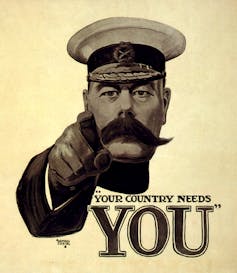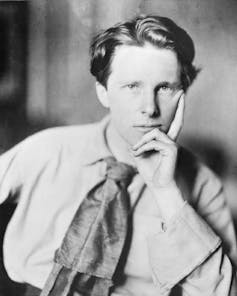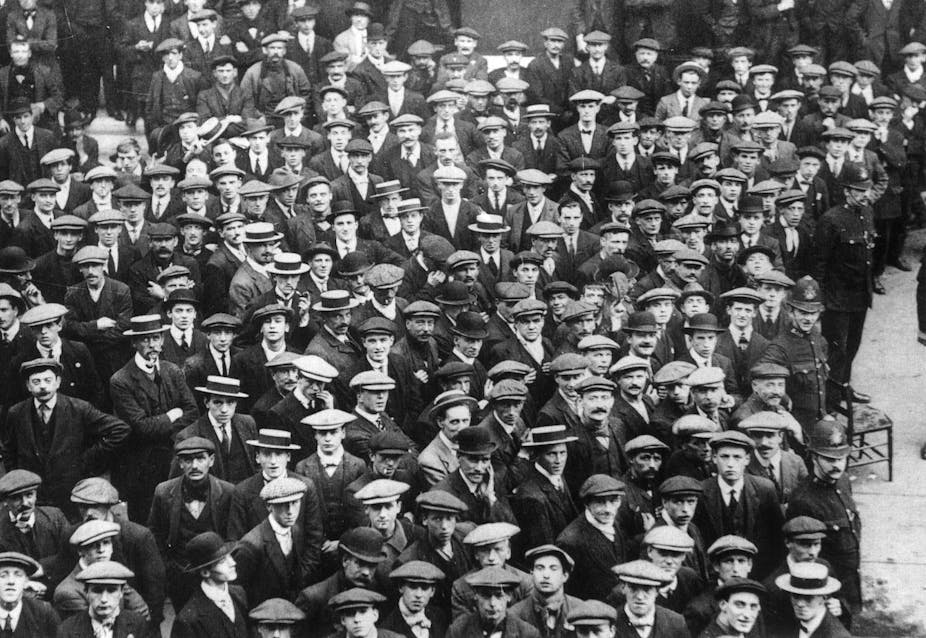On the first day of the war in 1914, British newspapers published appeals for young men to join the colours, and to fight against Germany. Following the advice of the new Secretary for War, Lord Kitchener, the government decided to raise a huge volunteer army, hoping that in two or three years, when the other combatants were exhausted, this would tip the scales in Britain’s favour.
Over the next few weeks, thousands of young men came forward. When the first grim news of casualties and of the retreat from Mons arrived in late August, more volunteered, and after the fall of Antwerp in early October, there was a renewed surge. On some days, more than 10,000 men enlisted.
By Christmas 1914, hundreds of thousands had come forward, and this continued well into 1915. Men from all social classes and all areas of Britain volunteered. Others who were overseas in August 1914 travelled thousands of miles to get back and enlist. Whole groups from individual companies, offices, and universities joined up together. There were far more volunteers than the government could arm or equip, and most had to spend months training in civilian clothes, without proper weapons.
National consensus
Why did so many volunteer? There was a huge recruiting campaign, led by newspaper advertisements, and supported by posters, including Reginald Leete’s famous image of a mustachioed Kitchener with pointing finger. Meetings were held in every town and village where politicians, priests, and local worthies exhorted men to do their patriotic duty.

There was a broad national consensus that Britain was fighting a righteous war, and that volunteering was, put simply, the right moral choice. We should not underestimate the climate produced by years of pre-war public discourse, which had anticipated a war against Germany in which young men would be needed to reinforce Britain’s small professional army. Since the Boer War there had been calls for conscription. These had been supported by invasion scares, and by novels such as Erskine Childers’ Riddle of the Sands. Reprints of this book were prefaced by the author’s call for every British man to do national service, “with the rifle”, or at sea. Officer Training Corps had prepared middle and upper class schoolboys for leadership, and given them some rudimentary training.

So strong was this mood that some volunteered even before the actual declaration of war. Siegfried Sassoon was one who enlisted, together with his horse, on reading in The Times that volunteers would be needed in the event of war. Rupert Brooke, who became the most widely read war poet, similarly recognised before the actual outbreak of hostilities, that he would affected: “It will be Hell to be in it, and Hell to be out of it,” he wrote.
Peer pressure
Undoubtedly the narrative of young men volunteering in a shared mood of patriotic enthusiasm has some strength. But others faced painful choices. For many men of military age the call to arms initiated a period of soul searching, often lasting for months. It was not a decision they made alone.
Some, like war chronicler Vera Brittain’s brother Edward, were pulled in different directions by friends and relatives. In his case, his sister urged him to volunteer, but his father refused to countenance the idea. Rupert Brooke did volunteer, after some weeks’ hesitation, but he faced bitter criticism from former Cambridge friends, many of them pacifists.

How many young men, now unknown to history, were pushed one way by friends and workmates, and pulled in another by anxious parents? Those who did not volunteer faced insults from the press, and were publicly ridiculed for their lack of “manliness”. Many were presented with white feathers by women, something which often left a lasting sense of shame. In the family, amongst friends in the pub, and in the workplace, they faced derision, contempt, and intimidation.
For some it took more courage not to volunteer than to yield to the pressure. Strikingly the only areas where volunteering fell below the high national average rate were in the countryside, where young men were exposed to less social pressure, and in places like rural Wales, where there was a tradition of pacifism.
It was indeed this growing social pressure which helped maintain the flow of volunteers well into 1915. The painter Stanley Spencer and the poet Edward Thomas, who both volunteered in July 1915 after months of indecision, are good examples. When, reluctantly, the government introduced conscription in March 1916, it found no great reservoir of manpower to tap. A high percentage of those conscripted appealed for exemption, and had to be coerced into service.
The narrative of voluntarism has given the British perception of World War I its particular poignancy. The soldiers who went over the top at the Somme were not conscripts, or pressed men. But we need, before succumbing to this mythology, to remember what the poet Charles Sorley pointed out after Rupert Brooke’s death: that it would have been more difficult for him not to have volunteered.

